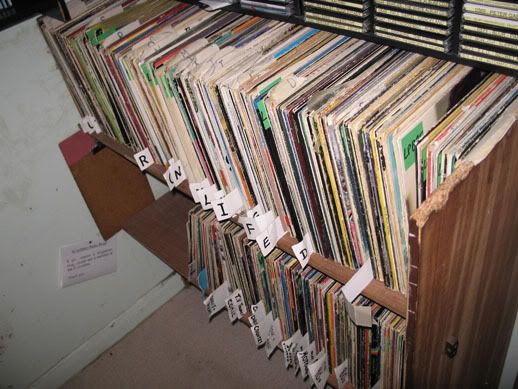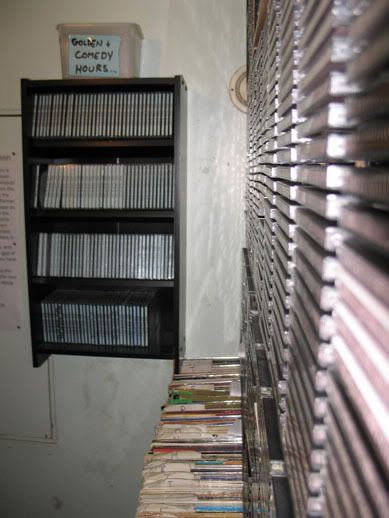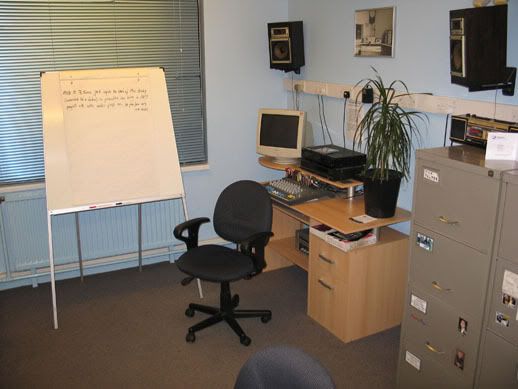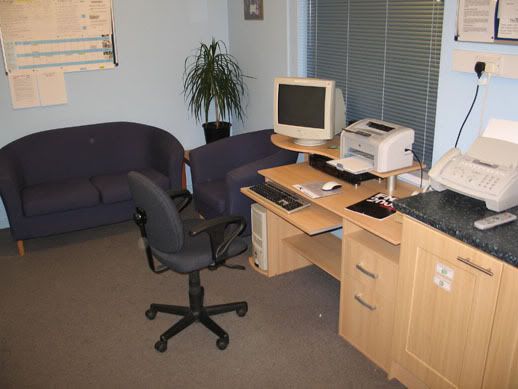The Story of Kingstown Radio
by Tom Robinson
The story of Kingstown Radio, in Kingston upon Hull, goes back to the 1950s when the Hull City Football club and its' supporters club, along with Kingston upon Hull Telephones Department and local cable company REDIFFUSION got together to discuss the possibility of providing football commentaries from Boothferry Park (Hull City's home ground) to local hospital patients.
After much discussion, the idea was put into practice, with a landline being installed at the ground, from where it was fed into the Hull telephone exchange and so onto the hospitals via the telephone lines. This became known as the TIGERFUSION service. The first match to be transmitted went out on 8th November 1952. The match was Hull City V Luton Town. Hull lost 2-0 (some things never change!). Towards the end of the 1950s, a young man by the name of Ken Fulstow bought himself what was in those days an item of some luxury....a portable tape recorder. Ken used the tape machine to send recorded messages to other enthusiasts throughout the UK and hit upon the idea of taping messages for people in local hospitals.
In 1959, the Hull Tape Recorder Club was established and as part of their constitution it was agreed to take messages to patients in the local hospitals. The organisation found rooms above a small record/electrical shop on Hull's Hessle Road (then the centre of the city's thriving fishing industry) and the members set about building a studio using all sorts of oddments (including egg boxes to soundproof the walls). They had an old radiogram, their own tape recorders and some odd furniture to complete the inventory
Members would visit the patients in the local hospitals and take note of their musical requests on tape....then rush back to the studio and edit the messages and recorded music into a programme, which would then be returned to the hosptials to 'be aired'. Often the programmes took many many hours of editing to come up with the finished product.
Ken approached the Hospital Adminstrators, Hull City Telephone Department and the SportsCommentary Association to see if it would be possible for the tape recorder club to make use of the existing landlines for broadcasting the request programmes.
It was finally agreed that the Club could use the landlines for 1 hour a fortnight for a trial period of three months. The trial was a great success and so permission was granted to the club to continue to use the facilities on a more or less permanent basis.
The first scheduled programme was transmitted on 16th July 1961 from the Hull Telephones Headquarters in Carr Lane. The first record to be played was Temptation by The Everley Brothers.
The club were forced to leave the Hessle Road studio when the area came up for redevelopment, and so new premises were found in the old city area, near the River Hull and Humber river junction at Wellington Street. The studio was situated on the top floor of the building, so each time the presenters & staff wanted to broadcast, they had to climb up 100 steps to get to the studio! This small attic room was to be home for a number of years, between 1969 and 1975
Sadly, the premises were badly damaged by fire in 1972. The fire was started by a visiting tramp, who, in an attempt to stay warm, lit a small fire and let it get out of control. For some time after that, due to somewhat inadequate roof repairs, presenters had to don raincoats and hats when using the studios in wet weather.
During this period, members of the tape recorder club came to the conclusion that the Radio work was now starting to take over from the original purpose of the Tape Recorder Club.
It was decided that the Hospital Broadcasting Service should be formed and registered as a charity. This finally happened in 1969 when the Hull & East Riding Hospital Broadcasting Service officially took over from the tape recorder club.
Tribute must be paid to the generosity of the Hull City Telephone Department who provided the telephone landlines (which carried the radio signal) free of charge. Without this generosity it is doubtful whether the new radio service could have survived those early years.
In the very early 1970s Ken Fulstow laid the Foundations for the National Association of Hospital Broadcasting Organisations (NAHBO), and the inaugural meeting of the Association was held in the City.
NAHBO now has a membership of over 300 stations and is affiliated to similar organisations in Europe and throughout the world.
The new organisation grew in strength and in 1975 the Wellington Street studio was vacated and the organisation moved to 98 Beverley Road (above the Red Cross offices). The members described the new studios as "absolute Luxury". Over £1,000 was spent renovating the building and providing new equipment. The first programme was transmitted on 5th March 1975.
On 28th November 1988 the organisation moved to custom built studios in the Kingston General Hospital on the city's Beverley Road. The facility comprised of two modern studios, record library and a members lounge. A caravan was donated by the Hull Lions, this was converted into a mobile studio and is still a regular sight at the many annual city events. Now with a membership of over 50 volunteers the organisation continued to flourish into the 1990s.
The Kingstown Radio Record Library (some 40,000 tracks and growing every day) was computerised allowing almost instant access to any record in a fraction of a second. In earlier days, a large file of index cards was used to record each title, so finding a particular disc could be quite a time consuming job, to say nothing of keeping the index cards up to date and in order!
On 6th December 1994, Kingstown Radio, , as it was now known, took advantage of the Restriced Service Licence (RSL) regulations and for a period of 28 days, 24 hours a day (until 2nd January 1995), broadcast its service on 87.8 FM to a potential audience of 600,000 people.
The service was transmitted from the Beverley Road studios (with the Kingstown Radio, staff being supported by a number of local Ex-Professional Radio presenters), The daytime programmes were actually produced in the Princes Quay shopping centre, in central Hull and relayed to the main studios via high quality music lines. Programmes were also presented live from a number of sites around the city and transmitted by wide band FM back to the main studio. The broadcast was a great success earning praise from all those who tuned in. The heavy cost of the broadcasting licence and Performing Rights fees was underwritten by the selling of advertising and sponsorship (even a small profit was made).
Kingston upon Hull's longest serving & most experienced Radio Station had, at last, come of age!
Such was the enthusiasm generated by the RSL that the experience was repeated again (9th July 1995-8th August 1995). Although a number of other local groups have run RSLs in recent years it is generally accepted that the Kingstown Radio, broadcasts set the benchmark for quality and have yet to be bettered.
Since the completion of the last RSL, huge amounts of time & energy have gone into preparing Kingstown Radio, for the Millenium. Additional studios have been built at Castlehill and are now fully operational. New studio at the Hull Royal Infirmary have been constructed to take over from the Kingston General Hospital studio, as that hospital has closed. Computerised studio management, re-writable CD recorders and Satellite news reporting have transformed the station into a very professional organisation broadcasting 24 hours a day! Modern PC technology now allows a presenter to produce a complete radio programme with a keyboard and mouse. He need never even touch a record or CD as the music is stored within the PC itself! Most recently, with the changes to the Wireless & Telegraphy Act we are now able to transmit the output of the station to the Hull Royal Infirmary at large on the AM (Medium Wave) band (1350AM). It is too early to comment on the success of this venture, but early feedback indicates that the listeners are delighted with the mix of music and chat.
How the early pioneers would envy the equipment we now use and the ability it gives us to reach our audience!!!!
© Tom Robinson, Kingstown Radio.
The Studios
Deep in the basement of Hull Royal Infirmary...



As you can see, we have a huge range of Viny'l and CD's, but the majority of our music and jingles etc are played using a digital package our computer system.

Myriad is the complete modular digital package for modern commercial radio, incorporating the latest in PC based technology. Myriad uses the power of the modern PC to complement traditional concepts in radio and provide, for the first time, a viable and cost effective complete automation system for commercial and community radio in a single package.
The complete Myriad system comes in the form of 3 main programs, Myriad for Management and Scheduling functions, Q-Next for dynamic full or semi-automatic and Myriad live! a simple but powerful tool for all presenters.
Combine these powerful features with a truly friendly and intuitive front end that everyone will enjoy using and it soon becomes clear how Myriad could help your station achieve it's full potential!
Key features of Myriad:
Studio Wall. Simple to use, visual carts for your audio providing presenters with instant access to audio and short- term automation for those all important coffee breaks! you never need to deal with the actual audio file.
Cart Players. Large and simple to use, the cart players include count -up, count-down. Myriad supports up to 6 audio sources (sound cards or juke boxes).
Auto schedule. Intelligent music, advert and jingle selection and scheduling system.
The Q-next Audio Engine. The intelligent auto-play system that dynamically alters to fit your jingles and sweepers into sarrounding songs giving a standard of output your DJ's will envy!
Databases. Myriad includes databases for every aspect of your radio station.
Q-Next. A constant visual log of scheduled output. Whether running automated or semi automated, Q-Next is the simple way to control your output.
Advert Management.Keep track of your clinets and their adverts. Automatically compile which adverts are played at what time and at what rates.
Power Net. Keeps Myriad studio machines 'in-sync' and gives the fastest response possible from modern PC's.
Security. Myriad's inbuilt security systems uses the users records to assign access to every part of the system. Your data and your system have never been more secure.
The company.
Formed in 1994 to investigate how new technology could be used to provide solutions to traditional problems in the radio industry. Power Systems has since employed it's Mechatronic roots to develop a range of products spanning the whole broadcast sector.


Our Myriad system was designed and supplied by:
P Squared Ltd,
1 - 2 Maritime House
Maritime Business Park
Livingstone Road
Hessle
East Riding Of Yorkshire
HU13 0EG
Tel: 01482-350700 FAX: 01482-350701
www.psquared.net
